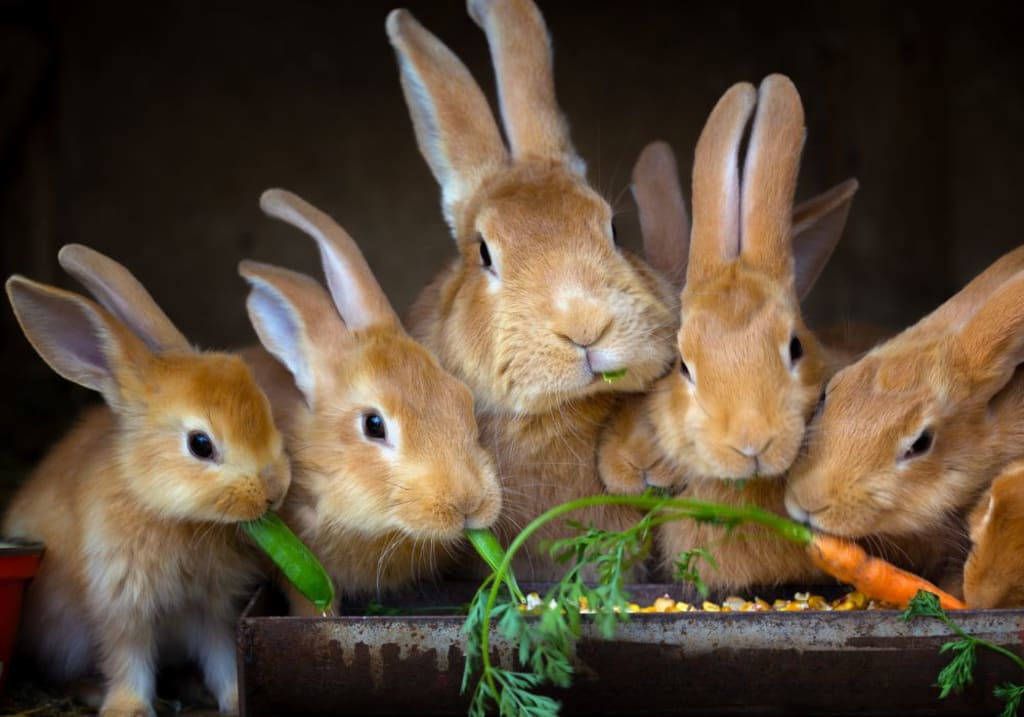
Introduction to Rabbit Diet: Why Vegetables Are Important
Rabbits are one of the most popular small pet animals and they can be a great and rewarding companion for life. It is important to understand their diet and nutrition requirements as part of providing them with an optimal lifestyle. Feeding best vegetables for a rabbit's diet is essential to ensure healthy growth, digestion, and overall wellbeing. Vegetables provide essential vitamins and minerals that are necessary for rabbits' development, energy levels, and their overall health. They are also rich in dietary fiber which helps to keep their digestive system functioning properly. It is important to select the right kind of vegetables suitable for rabbits as some vegetables are unhealthy or even potentially toxic for them.
What Vegetables Are Best for Rabbits?
When selecting vegetables from the grocery store, it is important to pick organic ones as far as possible as they free from pesticides or other harmful chemicals that may be present in non-organic produce. Some of the best vegetable choices include broccoli, Brussels sprouts, carrots, cauliflower, kale, parsley, spinach, turnip greens etc. Fruits like apples or pears can also be offered occasionally as a treat but should not form a major percentage of their diet. It is also important to ensure variety in the type of vegetables offered so that your rabbit gets all the essential nutrients they need each day. It is recommended to offer around 1 cup of fresh vegetables per 2-3 lbs. of body weight daily divided into two meals (morning and evening). Always wash the vegetables thoroughly before serving them since dirt or pesticide residue can cause an upset stomach or diarrhea in rabbits if ingested.
Conclusion
Feeding best vegetables for a rabbit's diet forms an important part of their overall health and wellbeing throughout life. Selecting fresh organic produce high in nutrients while avoiding potentially harmful foods can help keep your furry friend healthy and happy throughout its lifetime!
Types of Vegetables That Are Best for a Rabbit Diet
When it comes to the best diet for rabbits, vegetables form an important part. Feeding a rabbit the right vegetables is key to providing them with balanced nutrition and keeping them healthy. But what are the best vegetables for a rabbit's diet? The answer lies in selecting nutrient-dense vegetables that provide essential vitamins and minerals that these animals need. Choosing the right types of vegetables is paramount since rabbits have sensitive digestive systems that can easily be upset by certain foods. Vegetables that are high in fiber, low in sugar, and low in calcium are great options as they help keep your rabbit's digestive system running smoothly.
Dark leafy greens should form a large portion of your rabbit's diet, as they contain large amounts of vitamins A and C. Examples include kale, Swiss chard, collards, mustard greens, and turnip greens. Make sure to provide variety and alternate between different types of leafy greens as each type has unique nutritional benefits. Root vegetables like carrots, beets, parsnips, turnips, yams and potatoes are also great options for rabbits as they contain important minerals like potassium and phosphorus. When feeding root vegetables to your rabbit make sure to feed them uncooked or lightly cooked since some root veggies contain toxins that can become more concentrated when cooked too long or at too high of temperatures.
Fruits should also be included in your rabbit's diet as they provide essential vitamins and minerals such as vitamin A and C as well as dietary fiber for healthy digestive function. However, fruits should be fed sparingly due to their higher sugar content which can lead to GI upset or even obesity if fed in excessive amounts. Apples (without seeds), strawberries, blueberries, melons (without seeds), pineapples, peaches (without pits) are all healthy fruit choices for rabbits. Vegetables like broccoli and cauliflower should only be fed sparingly due to their high calcium content which can cause health issues if fed too frequently.
Other veggies like peppers (all colors), celery stalks (with leaves), cucumbers are also safe additions to a rabbit’s diet but again should be fed sparingly due to their lower nutritional value compared to dark leafy greens and root vegetables mentioned above.
Preparing Vegetables for a Rabbit's Diet
When it comes to feeding your rabbit the best diet, vegetables should be at the top of the list. Best vegetables for a rabbit's diet provide essential vitamins and minerals that are needed for your pet's overall well-being. Feeding vegetables can also reduce boredom and encourage natural foraging behavior. The key is to make sure you select vegetables that are safe for rabbits and prepare them correctly so they provide the most nutritional benefit possible.
The first step in preparing vegetables for a rabbit's diet is to choose quality produce. Avoid wilted or spoiled items as they may contain harmful bacteria or toxins which can cause digestive problems in rabbits. Also, avoid canned, frozen, or processed varieties of vegetables as these have been stripped of many of their nutrients. Select fresh, organic or pesticide-free vegetables whenever possible.
Once you've chosen fresh fruits and veggies for your rabbit, it's important to properly wash them before serving them up to your furry friend. This will help remove any pesticides, dirt, or other particles that could be dangerous if ingested by your pet. Use warm water and a mild detergent or fruit & vegetable wash to thoroughly rinse off all produce items before feeding them to your bunny.
It is also important to consider how you cut up your rabbit's veggies before giving them to him or her. Certain types of vegetables should be cut into small pieces so that they can be safely eaten by rabbits without causing any choking hazards. Larger pieces may need to be shredded first so that they are easier for rabbits to chew on without biting off chunks that are too big and difficult to swallow. Additionally, some types of veggies need to be steamed before eating in order for the nutrients inside them to become more accessible for digestion by your pet.
Overall, providing quality vegetables in a rabbit's diet is beneficial as it ensures proper nutrition while providing mental stimulation through natural foraging behavior. Make sure you choose fresh produce items when shopping and prepare them with safety in mind by washing and cutting them appropriately before letting your bunny munch away!
Ensuring a Balanced Diet for Rabbits
A balanced diet is essential for rabbits' overall health and wellbeing. Best vegetables for a rabbit's diet should make up the majority of their daily intake. When it comes to veggies, fresh, organic options are always the best choice. But which ones should you feed your furry friend?
Carrots and Carrot Tops
Carrots are one of the most popular options for rabbits, with both the root vegetable and carrot tops being suitable choices. Carrots are packed with healthy nutrients including beta-carotene, fiber, and vitamin A. However, due to their higher sugar content they should be given in moderation and always be fresh. Carrot tops will usually be enjoyed more than the root vegetable itself, as they contain more fiber which helps keep digestion regular.
Green Leafy Vegetables
A variety of leafy greens such as kale, cabbage, romaine lettuce, dandelion greens, parsley and spinach can also make up a large part of a rabbit's diet. These types of veggies contain various essential vitamins like calcium and magnesium as well as minerals like potassium and copper that are all necessary for healthy bones. But again because these vegetables may contain higher levels of oxalic acid which could cause bladder stones in some rabbits, they should not be overfed or given too frequently.
Root Vegetables
Root vegetables such as turnips, rutabagas, radishes and potatoes can also provide additional nutrients to your bunny's diet but in moderation since these are starchy vegetables. Higher amounts may lead to obesity or digestive issues like diarrhea or gas in some cases so it’s important to only feed them occasionally while sticking with other low-carb veggies instead whenever possible.
Fruit
Fruits can provide extra vitamins to your furry friend's nutrition plan but they should be limited since they are high in sugar content that can upset a rabbit’s delicate digestive system if overfed. Some of the safe fruits include apples (no seeds), bananas (mashed), melons (seedless) as well as grapes (halved). These fruits should only make up 10-15 percent of an adult bunny’s daily food intake when fed occasionally as treats or snacks throughout the week.
Conclusion: The Benefits of Including Vegetables in Your Rabbit's Diet
When it comes to feeding rabbits, vegetables play an important role in providing them with the vitamins and minerals they need for a healthy diet. Best vegetables for a rabbit's diet include dark leafy greens such as kale, collard greens, and parsley, as well as root vegetables like carrots and beets. These types of vegetables are packed with vital nutrients that are beneficial to your rabbit's health. Additionally, these vegetables can also help to improve their digestive system by introducing more fiber into their diet. Including vegetables in your rabbit's diet can also help to keep their teeth healthy and strong.
Rabbits have continuously growing teeth, so gnawing on crunchy vegetables helps them wear down their teeth properly. This ensures that their teeth don't become overgrown or too sharp which could lead to discomfort or pain for the rabbit. Vegetables provide your rabbit not only with essential nutrients but also mental stimulation that encourages natural behavior. Eating crunchy foods helps your rabbit stay entertained while also allowing them to explore different flavors and textures which will help keep them from getting bored with their food.
Overall, adding vegetables to your rabbit's diet is key in providing them with the vitamins and minerals they need while simultaneously helping them stay happy and healthy. Incorporating a variety of fresh and nutritious veggies into your pet’s diet is essential for optimal health and wellbeing, so make sure you’re giving your furry friend the best possible nutrition when it comes to best vegetables for a rabbit's diet!
About the Creator
Hasan
Welcome...
In this site of mine you can learn amazing things and many information that you don't know so please subscribe to my site.
Enjoyed the story? Support the Creator.
Subscribe for free to receive all their stories in your feed. You could also pledge your support or give them a one-off tip, letting them know you appreciate their work.






Comments (1)
Oh glad. It was such a nice reading.